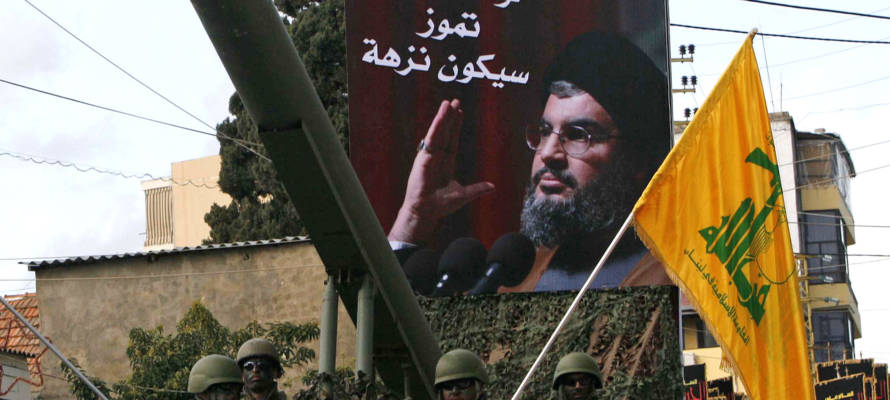IDF Chief of Staff Aviv Kochavi warned the French president that Hezbollah terrorists have “thousands of missiles and rockets” aimed at Israeli civilians.
By TPS
On the last day of his three-day visit to Europe, President Reuven Rivlin was in Paris for a diplomatic meeting with President Emmanuel Macron of France.
At the invitation of the presidents of Germany, France and Austria, Rivlin held meetings “on the dangers of Hezbollah’s rising power, the intensification of Iran’s nuclear project, and the International Criminal Court.”
Before the meeting Thursday, the president was received with an official honor guard by the French president at the entrance to the Palais de l’Elysee.
The presidents began their meeting with lunch and continued to their diplomatic meeting where they were joined by IDF Chief of Staff Lt.-Gen. Aviv Kochavi, who briefed Macron on security affairs which focused on concerns about Hezbollah’s military build-up in Lebanon.
Speaking about Hezbollah’s military build-up, supported by Iran, Rivlin said that Israel hopes France will continue to take part in the international efforts to ensure that the Lebanese government makes the necessary reforms to weaken Hezbollah’s position in the Lebanese political system and in the institutions of governance.
Kochavi said that “from a security perspective, Lebanon has become a hostage in the hands of Hezbollah, a terrorist organization, has lost control over its security policy and, as evidence of that, is not implementing UNSCR 1701.”
Resolution 1701 was adopted by the Security Council and was intended to resolve the 2006 Second Lebanon War. It demands Hezbollah retreat northward to the Blue Line, and that the government of Lebanon and the UNIFIL deploy their forces in the south.
Kochavi warned that Hezbollah has “thousands of missiles and rockets deployed in the heart of civilian populations and is deliberately aiming them in order to harm Israeli civilians,” and said that the IDF “will do everything to prevent this.”
“We have thousands of targets in Lebanon, and that list grows every week. We also have extensive capabilities with which to destroy them. We will not hesitate to attack with power if ordered, in any place where there are armaments, combatants or infrastructure that supports the enemy. The Lebanese government is responsible for changing the situation. The government and the Lebanese state will bear full responsibility for any Hezbollah action against Israeli citizens.” He warned.
Speaking to the press, Rivlin said that the Abraham Accords signed with the United Arab Emirates, Bahrain and Morocco “bring genuine hope to the peoples of the region as a whole,” saying that “it feels like the voices of moderation, pragmatism and peace are heard more and more. If we can strengthen those voices, the Middle East and the Mediterranean will enjoy regional cooperation in the fields of energy, trade, infrastructure and tourism which will bring progress and prosperity to us all.”
Speaking about the dangers of Iranian military build-up, the president noted that “the vision of partnership and peace will only come through determined opposition to Iran’s radical and aggressive stance that is expressed through its nuclear program and support for terrorist organizations. We have no territorial dispute or conflict with the Lebanese people and we hope that our friends, including France, will continue to hold the Lebanese government responsible for terrorism emanating from its territory. I hope that the winds of change blowing through the region will reach the Palestinian arena and help restore confidence between our peoples.”
Macron reiterated France’s “unwavering attachment to the security of Israel, and our determination to remain committed, at its side, to guarantee regional stability.”
On the recent nuclear developments in Iran, Macron said that he “wants to be very clear here, our concern about this. And I repeat very clearly, there is no ambiguity in this regard, Iran must stop making a most serious nuclear situation worse by continuing to violate the Vienna Agreement. The security of the entire region is at stake.”
He demanded that Iran “do what is expected of it and behave responsibly. France is fully mobilized in favor of relaunching a credible process which will make it possible to find a solution to this crisis; that is, to return to control, to the supervision of nuclear programs, but to include, as we have been advocating since 2017, control of Iran’s ballistic activity in the region.”
As for the situation in Lebanon, he said “there too, we seek stability and peace and I believe that we are both convinced, that the time for testing responsibility is coming to an end, and that we will be undoubtedly required to change the approach and methods in the coming weeks, in a very clear way, because as of last August we cannot leave the Lebanese people in the situation they are in.”
“More generally, we must work together to find answers to the security concerns of states in the region. Among the many crises that clearly affect Israel’s environment, there is Lebanon that I have just mentioned, and we must do everything to prevent the collapse of the country, and therefore accelerate the formation of a government and the necessary reforms,” he said.
This last meeting in Paris concluded the president’s diplomatic visit to Europe and he returned to Israel.
